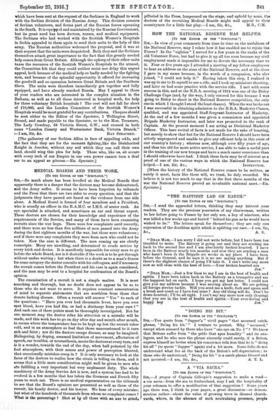MEDICAL BOARDS AND THEIR WORK.
[To THE EDITOR 07 THB " SPECTATOR."]
Srn,-So much abuse has been levelled at the Medical Boards that apparently there is a danger that the doctors may become disheartened, and the Army suffer. It seems to have been forgotten by tribunals and the Press that there are two sides to every question, and that the judgments they have passed are based on the evidence from one aide alone. A Medical Board is formed of four members and a President, who is usually an officer in the R.A.M.C. or I.M.S. of senior rank. An eye specialist is attached, and sometimes an ear and throat expert. These doctors are chosen for their knowledge and experience of the requirements of the Service, and many of them have been examining recruits since the war begn. There were few complaints until recently, and there were no less than five millions of men passed into the Army during the first eighteen months of the war, but these were volunteers ; and if there wore any complaints they were from men who could not be taken. Now the case is different. The men coming up are chiefly conscripts. Many are unwilling, and determined to evade service by every trick and device. It is manifestly impossible for every man to go before the whole Board, nor is it desirable if the work is to be got through without undue waiting ; but when there is a doubt as to a man's fitness for some category the doctor consults with his colleagues, and if necessary the recruit comes before the President and his case is again considered, and the man may be sent to a hospital for confirmation of the Board's opinion.
The examination of a recruit is not a simple matter. It is most searching and thorough, but no doubt does not appear to be so to those who do not want to serve. It requires constant concentration of mind to separate statements that are worthless from those that denote lurking disease. Often a recruit will answer " Yes " to each of the questions : " Have you ever had rheumatic fever, have you ever spat blood, have you had fits, or had a discharge from your ears ? " And each one of these points must be thoroughly investigated. Not for one moment may the doctor relax his attention or a mistake will be made, and this work has to go on day after day and month after month, in rooms where the temperature haste be kept up lest the recruit takes cold, and in an atmosphere so foul that those unaccustomed to it turn sick and faint ; nor do the doctors escape disease, as may be imagined. Malingering, by doping, assumed limitation of movement, affectation of speech, car troubles, or neurasthenia, meets the doctors at every turn, and is it a wonder, towards the end of the day, when half poisoned by the ford atmosphere, with their senses and power of perception blunted, that occasionally mistakes creep in ? It is only necessary to look at the faces of the doctors to realize how the strain is telling on them, and it seems that a little more consideration might well be given to men who ate fulfilling a very important but very unpleasant duty. The whole machinery of the Army Service Act is new, and a system has had to be evolved in a few months that has taken the Germans and French fifty years to work out. There is no medical representative on the tribunals to see that the Board's opinions are presented as well as those of tho recruit, his family doctor, and his lawyer. We hear of every mistake; but what of the hundreds of thousands from whom no complaint comes ? What is the percentage ? Shot at by all those with an axe to grind, pilloried in the Press, lampooned on the stage, and upheld by none, the doctors of the recruiting Medical Boards might well appeal to their countrymen for a little fair play.—I am, Sir, &c., M.B., C.M.


































 Previous page
Previous page